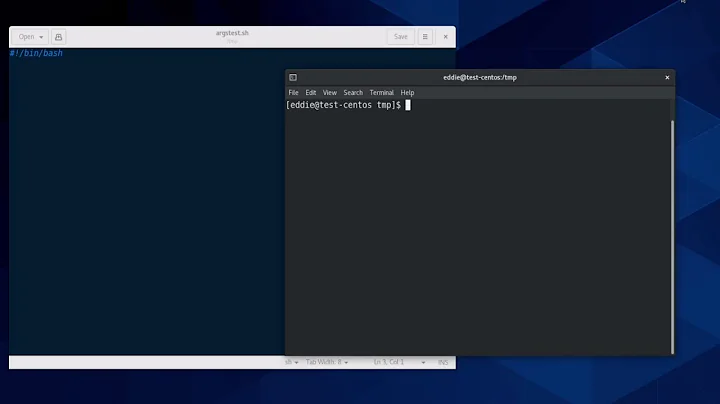Capture the output of a shell function without a subshell
Solution 1
There is a hack, but I think it just make sense if you need it in a loop.
you can open a cat coproc like this: coproc CAT { cat; }
This will start a cat command in background, and set two environment variables: CAT_PID and CAT. The CAT variable is an array with STDOUT and STDIN (in this order) file descriptor (pipes) used by cat.
So, you can execute anything writing the output to &${CAT[1]} that represents the STDIN, and use the builtin command read to set your variable reading from ${CAT[0]} that is the STDOUT of cat.
Here a sample:
coproc CAT { cat; }
echo 123 >&${CAT[1]}
read myvar <&${CAT[0]}
To test:
echo $myvar
123
Don't forget to stop the cat after use it. You can do it by by killing the process.
kill $CAT_PID
This makes a great difference in performance tuning.
Update: bash implements strings null delimited. So when dealing with binary data, read is really tricky. You can read with LC_ALL=C read -r -n1 -d $'\0' one byte at time, then the null will be empty strings on ${REPLY} variable.
Solution 2
With bash you can also do it like this :
read a < <(echo hello)
echo "$a"
Or like this :
shopt -s lastpipe
echo hello | read a
shopt -u lastpipe
echo "$a"
But you still have to launch a sub-process which will run ruby, so I don't really understand what you are trying to avoid...
Solution 3
If on Linux, with bash versions prior to 5.1, you could do:
{
chmod u+w /dev/fd/3 # only needed in bash 5.0
rbenv local > /dev/fd/3
IFS= read -rd '' -u 3 variable
} 3<<< ''
That does use a temp file like every here-document or here-string, though that's hidden to you. bash 5.1 switched to using pipes instead of regular temp files.
If rbenv outputs less data than can fit in a pipe without blocking (typically 64KiB), still on Linux and Linux only, you can use a pipe instead of the temp file with:
{
rbenv local > /dev/fd/3
IFS= read -rd '' -u 3 variable
} 3< <(:)
With ksh93 or recent versions of mksh, use the form of command substitution that doesn't start a subshell:
variable=${
rbenv local
}
Beware that contrary to the IFS= read -rd '', that removes the trailing newline characters in the output (like all command substitutions).
Related videos on Youtube
dgmike
Updated on September 18, 2022Comments
-
dgmike almost 2 years
I have
rbenv(ruby version manager) installed on machine and it works like that:$ rbenv local 2.3.1Writing to stdout the local version of my ruby. I want to rescue this version and declare it in a variable to reuse in another occasion.
$ declare -r RUBY_DEFINED_VERSION=$(rbenv local) $ echo Using ruby version $RUBY_DEFINED_VERSION Using ruby version 2.3.1It works!
But I don't want to use a subshell to do the work (using
$()or``). I want to use the same shell and I don't want to create a tmp file to do the work.Is there a way to do this?
Note:
declare -ris not mandatory, it can be a simplevar=FOOBAR.-
 Yunus over 7 yearsif you wanna call rbenv in current shell ; then you need at laest a named pip ; cmd > fifo; var="
Yunus over 7 yearsif you wanna call rbenv in current shell ; then you need at laest a named pip ; cmd > fifo; var="<fifo" ! -
 Kusalananda over 7 yearsAny reason for not wanting to use
Kusalananda over 7 yearsAny reason for not wanting to use$(...)or temporary file? -
dgmike over 7 years@Kusalananda The
rbenv localchanges some variables and I want to use these variables. The shell script will run on various projects and I can't trust in/tmpor permissions. Some machines I just can write on/var/tmp. -
 Kusalananda over 7 yearsCan't you just parse the
Kusalananda over 7 yearsCan't you just parse the.ruby-versionfile in the current directory? BTW, I can not find anything that saysrbenv localchanges anything. It's supposed to only report the local version according to github.com/rbenv/rbenv#rbenv-local -
dgmike over 7 years@Kusalananda in case of
rvm(the shell script will prevent therbenvandrvm) some variables are set, likeRUBY_VERSION. But I think I can usecat .ruby-version. :-) -
dgmike over 7 years@JigglyNaga I really don't wan't to use
tmpfile. It must exist another way. -
George Vasiliou about 7 yearsIf we forget the temp files, why you don't want to use the
$( )method? Is a temp subshell that will only be used to return to your variable the output of the command.... -
George Vasiliou about 7 yearsYou can use
read variable < <(rbenv local)witch as far as i know works on the same shell using process substitution.
-
-
 ton over 6 yearsI really don't understand why this answer was downvoted.
ton over 6 yearsI really don't understand why this answer was downvoted. -
Niklas Holm almost 6 years
IFS= read -r -d $'\0' myvarto read null-delimited data -
 Alexander Mills over 5 yearswhat is a? is that a variable?
Alexander Mills over 5 yearswhat is a? is that a variable? -
 ton over 5 years
ton over 5 yearsread a, whereain this case is a variable where theread commandyou put the content readed. The commandreadwill create or replace this variable and you can put any non-reserved word here, If you do not want to choose a name, you can omit it and the default variable name isREPLY, so you can read the content from$REPLY, usehelp readfor more details. -
 Mark Haferkamp almost 5 yearsYour first method has a subshell, breaking variable assignment. So
Mark Haferkamp almost 5 yearsYour first method has a subshell, breaking variable assignment. Soread a < <(foo=bar; echo baz); echo "$a:$foo"outputsbaz:instead ofbaz:bar. Your second method doesn't change$a's value. Maybeshopt -u lastpipeis broken for me? -
 GiovaLomba over 4 yearsRunning
GiovaLomba over 4 yearsRunningbash -x yourscript.shwith your first code example makes very clear the problem. You are doing command substitution hence the command runs in a subshell. While second examples runs in the current shell so even running changing environment commands will work well. Thank you. -
 GiovaLomba over 4 yearsTo avoid you headaches remember that bash builtin man pages says:
GiovaLomba over 4 yearsTo avoid you headaches remember that bash builtin man pages says:lastpipe: If set, and job control is not active, the shell runs the last command of a pipeline not executed in the background in the current shell environment.







